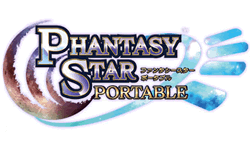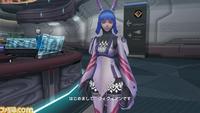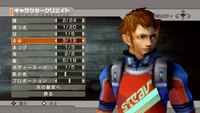|
|

|
PLATFORM
|
PSP
|
BATTLE SYSTEM
|

|
INTERACTION
|

|
ORIGINALITY
|

|
STORY
|

|
MUSIC & SOUND
|

|
VISUALS
|

|
CHALLENGE
|
Moderate
|
COMPLETION TIME
|
20-40 Hours
|
|
OVERALL

|
+ Great visuals.
- Repetitive.
+ Terrific character creation system.
- Repetitive.
- Mentally handicapped AI.
- So very, very repetitive.
|
Click here for scoring definitions
|
|
|
The year was 2006. The Xbox 360 had been around for a year already, and yet very few RPGs had graced the console. There was Bethesda's critically acclaimed Elder Scrolls IV: Oblivion, From Software's attractive but auditorially challenged Enchanted Arms, and finally, Sega's half-single player, half-MMO Phantasy Star Universe. With Blue Dragon and Lost Odyssey in the foreseeable future, I had recently picked up an Xbox and, looking for an RPG fix, turned to that abysmal game. Repetitive, grindy, and generally boring, Phantasy Star Universe's single player campaign was a joke. The potential for multiplayer existed, but sadly Sega decided to charge for that service, a poor decision considering the competition to be found in the likes of World of Warcraft and Final Fantasy XI, among others. It didn't take me long to toss the game in favor of something better. Little did I know that two and a half years later I would be playing the exact same game, but on the PSP. Ladies and gentlemen, this is Phantasy Star Portable.
Calling Phantasy Star Portable a sequel to its console forefather is somewhat misleading, as the game is virtually identical. Rather than following the exploits of a predetermined character, however, PSP allows the player to generate his own and enter the story, though this does not particularly matter. As with most JRPGs that allow the player to mold his own character, the player's role in the story is almost nonexistent. The story instead focuses on the other main character, a one-month old CAST (android) named Vivienne who regularly bombards the player with pointless and irritating questions. The player's responses don't really have much of an effect on the game, but can alter the ending slightly.
Taking place sometime after Phantasy Star Universe, the player has just recently joined the GUARDIANS (what exactly that acronym stands for, I have no idea). Remnants of the SEED, the monstrous creatures from Universe that were thought to be sealed away, have started appearing alongside a terrorist woman. The story plods along, forcing atrocious dialogue and wild, meaningless tangents of discussion down the player's throat. The characters are bland and uninteresting, the writing is terrible, and it's generally good practice to simply skip cutscenes and move along with the game.
 Aigis she is not.
Aigis she is not.
|
|
That's not to say the gameplay is much better, it's just slightly more engaging. Phantasy Star Portable is a fairly straight-forward action-RPG, wherein the player can choose from a wide assortment of different weapons, each of which have different attack speeds and ranges, and switch between them at will. The player can also choose between three basic classes and five advanced classes, which change the weapons that can be used as well as how proficient the character is at using them. Melee weapons are by far the most fun to use, though they are still quite simple. The square button launches a basic combo attack while the triangle button unleashes a special attack. Ranged weapons are a bit less interesting, as they only have a basic firing attack. Instead of special attacks, they can be equipped with bullets that add different attributes to the attack. While using them exclusively can get boring quickly, they can be useful in some situations. Likewise, technic weapons, Phantasy Star's version of magic, can be set with various spells, but unfortunately are fairly slow to cast and difficult to aim, making their usefulness fairly limited.
On a basic level, Phantasy Star Portable's battle system is solid, if somewhat minimalistic. However, the game completely fails to give the player any reason to continue playing. The gameplay seen in the first hour is the same as the next twenty, with the only variety coming from boss fights. The battle system is also supported by atrocious AI from the party members as well as a ridiculous balancing of class types. Of the roughly one dozen party members available by the end of the game, only two are not hunters. These party members are essentially useless, lacking even the slightest hint of common sense. They are incapable of attacking from a distance, sometimes won't attack enemies right next to them, and are unable to use healing spells in any kind of logical way. Several times during the game, party members that were able to use healing spells would let themselves and the party sit at a fraction of health for upwards of ten seconds, ultimately dying when the next enemy attacked.
Phantasy Star Portable also likes to make the player grind, and grind a lot. The essential layout of the mission-based gameplay is as follows: Do a story mission, watch a cutscene, do a free mission, a new story mission is unlocked. Each mission is broken up into simple segments where the player fights enemies, gets keys to unlock doors, and ultimately fights a boss. This is the format for the very first mission as well as the very last mission, and it does not change in between. The player can also expect to do far more than a single free mission between story missions, however, as the level increase between story segments is quite significant, and the player will need to catch up. This is particularly true in the final dungeon, where the boss has three forms to defeat, each more frustrating than the last.
 The character designer is probably the game's best feature.
The character designer is probably the game's best feature.
|
|
The game's problems don't end there. Since it was originally intended as an MMO, the game, even during single player mode, behaves like one. That is to say, there is no way to pause the game aside from putting the system to sleep. The game can also only be saved in the central town hub, which limits its portability. Most missions take anywhere from twenty minutes to an hour to complete, so this can be a problem if one can only play for fifteen minutes. As a slight act of redemption, the player can choose to quit a mission at any time, returning to town with all experience and items intact. However, the points which improve class levels and unlock advanced classes are only obtained when a mission is cleared, and likewise for moving the story forward.
As far as redeeming qualities go, the visuals are certainly a point in Phantasy Star's favor. While the dungeons can quickly get repetitive to look at, they are nonetheless attractively designed. Likewise, the character models are smooth and detailed. By far the best aspect of the visual design, however, is the terrific character designer. Players can choose from four races and a wide assortment of facial, hairstyle, and costume options to customize their character. It's also extremely user-friendly and intuitive to use, lacking the more useless sliders that many western RPG developers provide.
The soundtrack is also fairly pleasant to listen to, and the voice acting is generally pretty good, ruined only by the terrible writing. Ironically, two of the biggest exceptions to this are the main character Vivienne and the main antagonist Helga. While neither perform well, the latter is particularly atrocious.
To be fair, Phantasy Star Portable really wasn't meant to be played solo, and one really has to question why Sega bothered with such a half-baked single player mode to begin with. Unfortunately, with multiplayer only being available over ad-hoc, it is likewise limited in appeal. Phantasy Star Portable seems like it was designed for a subculture that simply doesn't exist in North America—the same subculture that plays Monster Hunter Freedom in Japan. On this side of the Pacific, you'll be hard-pressed to find three nearby people who own PSPs, let alone three people who own the game.
If you can track down three friends to play with and enjoy this style of gameplay, Phantasy Star Portable might be an enjoyable experience. However, it remains an excessively repetitive grindfest with little lasting appeal, regardless of multiplayer capabilities. As a 20+ hour single player experience, it is simply awful. Aside from a very small subset of people, this is a game that can easily be passed up.
Review Archives
|









